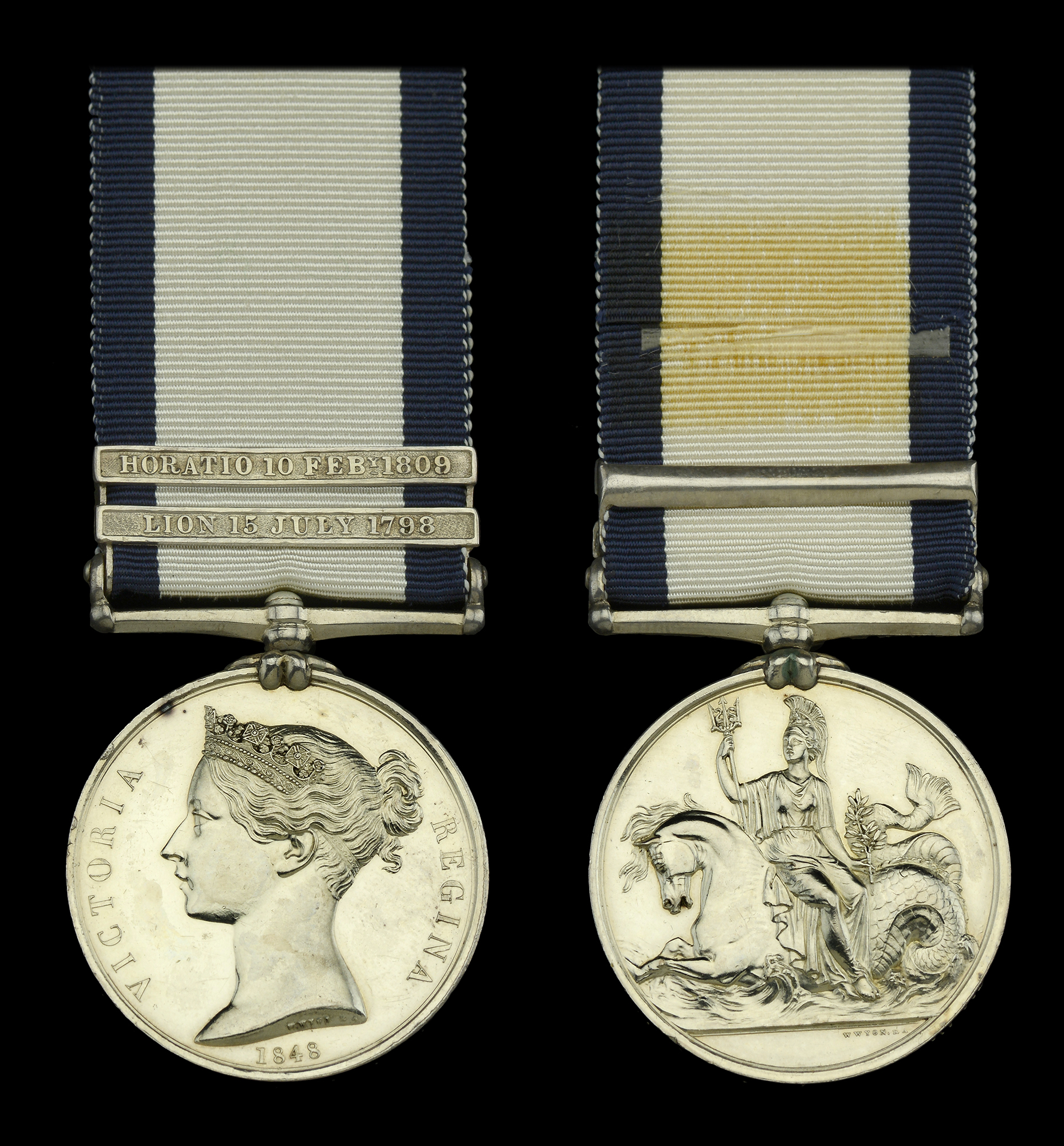The unique 2-clasp frigate action Naval General Service medal awarded to Admiral Manley Hall Dixon, Royal Navy, Master’s Mate of the Lion at the capture of the Spanish 42-gun frigate Santa Dorotea in July 1798, and Lieutenant of the Horatio at the chase and capture of the French 40-gun frigate Junon in February 1809, on which latter occasion he was severely wounded Naval General Service 1793-1840, 2 clasps, Lion 15 July 1798, Horatio 10 Feby 1809 (M. H. Dixon, Lieut. R.N.) nearly extremely fine £20,000-£24,000 --- Importation Duty This lot is subject to importation duty of 5% on the hammer price unless exported outside the UK --- --- Provenance: Hamilton Smith Collection, Glendining’s, November 1927; Bob James Collection, September 2007. Approximately 23 clasps issued for Lion 15 July 1798; and 13 clasps issued for Horatio 10 Feby 1809, this combination being unique. Manley Hall Dixon was born on 8 June 1786, at Stoke Damarell, Devon, the son of Admiral of the Red the late Sir Manley Dixon, K.C.B. (who commanded in chief at Plymouth from April 1830 to April, 1833, and died on 8 February 1837), by his first wife, Miss Christiana Hall, of Jamaica; and brother of Captain Mathew Charles Dixon, R.E. This officer entered the Navy, in June 1794, as First-class Volunteer on board the Porcupine 24, commanded by his father, with whom he continued to serve, as Midshipman, Master’s Mate, and Acting-Lieutenant, in L’Espion 38, the Lion 64, and Le Généreux 74, on the Channel, North Sea, Irish, and Mediterranean stations, until August 1801. On 15 July 1798, being off Carthagena, he took part in a brilliant action between the Lion and four Spanish frigates of 42 guns each, which terminated in the surrender of one of the latter, the Santa Dorothea; subsequently to which, when in company with the Penelope and Foudroyant at the blockade of Malta, he further assisted at the capture, 31 March 1800, of the French 80-gun ship Guillaume Tell, after a tremendous conflict, in which the Lion experienced a loss of 8 men killed and 38 wounded. When in Le Généreux, Mr. Dixon witnessed the taking, 24 August 1800, of La Diane, of 42 guns, and the surrender, in Sepember. following, of the island of Malta. On next accompanying his father into the Alexander 74, he was officially promoted, by commission dated 10 April 1802. The latter ship being paid off in the ensuing August, he was afterwards appointed, 7 October 1803, to the Terrible 74, Captain Lord Henry Paulet, which ship, while in pursuit, in the West Indies, of a squadron under M. Villaumez, was totally dismasted and all but lost during a terrific hurricane of 36 hours’ continuance, 18 and 19 Aug. 1806. On 4 June 1807 he was appointed to the Horatio 38, Captain George Scott. On 10 February 1809, being First-Lieutenant of that frigate, he was badly wounded by a musket-ball, which entered the left groin and passed through the thigh, while sharing in a long and severe action which terminated in the capture – with a loss to the Horatio (then in company with the Latona 38, and Supérieure and Driver sloops) of 7 men killed and 26 wounded – of the French 40-gun frigate La Junon. For his gallantry on the occasion he was eventually promoted to the rank of Commander by commission dated back to the day of the action; and, besides the receipt of a gratuity from the Patriotic Fund, was awarded for his wounds a pension of £250. Captain Dixon, whose next appointment was, 22 October 1810, to the Fly brig, attained Post-rank on 28 June 1811. From that period he officiated as Flag-Captain to his father, in the Vigo and Montagu 74’s, on the Baltic and South American stations, until 29 July 1813, when he exchanged into the Nereus 42. After accompanying the homeward-bound trade to the northward as far as the Equator, Captain Dixon assumed charge of a small squadron stationed in the Rio de la Plata. He left the Nereus on 11 January 1815, and afterwards commanded the Pallas 42, on the West India station, from 15 March 1831, until some time in the following year; and, since 22 May 1845, was employed as Captain of the Caledonia 120, at Devonport. He became Rear-Admiral in December 1847; Vice-Admiral in February 1855; and full Admiral on 1 November 1860. Admiral Manley Hall Dixon died on 3 March 1864.





